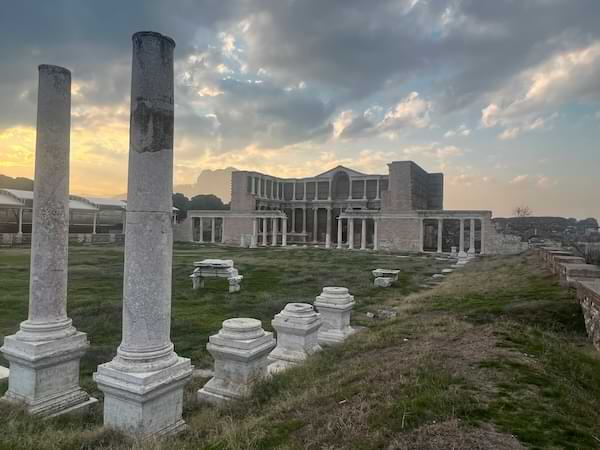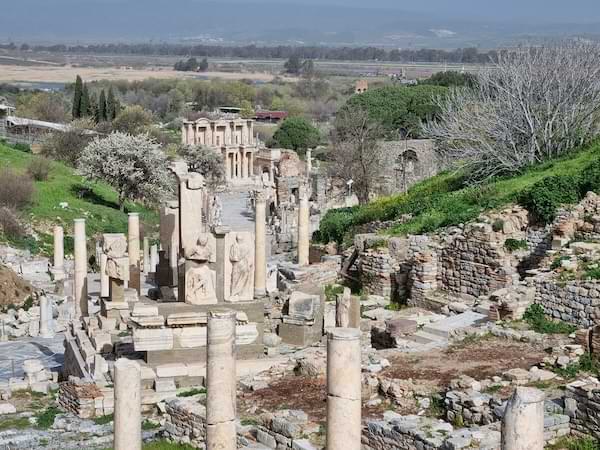The seven churches: Sardis
When you were ready to choose a church to join, how did you decide which churches to visit? Did your choice follow an internet search, a friend’s advice, or maybe the congregation’s history of success? Jesus’ words to the church of Sardis speak to the importance of having a genuine, active faith and witness to the world, rather than simply relying on an appearance or a past reputation of faith.
Sardis was about thirty miles south of Thyatira and an important city for commerce and strategic military defense. A road ran through it, and because of its topography, it was used as a refuge when the people were threatened. Historically, the city had only been taken captive twice because natural, almost vertical rock walls surrounded it on three sides. The region was wealthy because of its commerce and trade, especially wool and other fabrics.
Sardis boasted an acropolis dedicated to Artemis and a large necropolis, or burial ground, just a few miles from town. Sardis was a strong city for the first two hundred years of Christian history, but was likely showing signs of decline when John received the Revelation.
Jesus identifies himself to the church in Sardis as the one “who has the seven spirits of God and the seven stars” (Revelation 3:1a). Jesus wants the church to know two essential truths:
- He controls the seven spirits of God.
- His Spirit bestows the blessings, guidance, and judgment upon all the churches.
What did Jesus know about Sardis and want them to do?
Jesus said, “I know your works. You have a reputation of being alive, but you are dead” (Revelation 3:1b). The city of Sardis was practically immune to attack from foreign enemies and comfortable economically. The city’s citizens were thought to be easily successful and generally unafraid. The city had an excellent reputation because of its history, but a closer look revealed the people had grown weak and apathetic because of the ease of their lives.
Apparently, the city’s apathy had also influenced the Christian church. Jesus told that church, “Wake up, and strengthen what remains and is about to die, for I have not found your works complete in the sight of my God” (Revelation 3:2).
Jesus knew apathy was a greater weakness than people realized. Jesus knew their works, whether they were of God or not. The church’s reputation was good with others, but not with God.
Why is apathy unacceptable to God?
God’s standards for our lives are much higher than we tend to recognize. So often, we measure the success of our spiritual lives by the standards of those around us. We tend to compare our church programs with those of a sister church in the same city. Reputations are often gained by using earthly standards rather than God’s. Jesus taught Sardis that their works might be good in the eyes of others, but God disapproved of them.
Jesus said, “I have not found your works complete in the sight of my God.” God’s biblical standards are the only standards we can use to measure spiritual success. Our works might earn us a good reputation with others, but if we haven’t been obedient to God’s Spirit-led guidance, our works are “incomplete” in his eyes. Our good ideas can earn us a good reputation, but following God’s plan is the only option for those who want to please him.
What is God’s solution for apathy?
Jesus clearly taught the church in Sardis what they needed to do:
- “Wake up” and “strengthen what remains and is about to die.
- “Remember” the teaching they had received and heard.
- “Obey” and “repent” so they could return to God’s favor and blessing.
Jesus told the church, “If you will not wake up, I will come like a thief, and you will not know at what hour I will come against you.” Jesus wanted them to know that God would judge their lack of genuine, Spirit-led faith if they did not change. They needed to stop accepting what was unacceptable to God. Their reputation was good with others, but it was God’s expectations they were required to fulfill.
What is God’s reward for those who remain strong?
It seems most in the church had relaxed God’s standards for their faith, but not all. Jesus pointed out that the church still had a few people who had not “soiled their garments” and walked obediently with Jesus in a pure way, wearing “white.” Jesus commended these, saying, “They are worthy.” (Revelation 3:4)
No church is filled with saints or hypocrites. Every church has both, and there is grace for the humanity we all wrestle to overcome. We can’t completely avoid sin, but Jesus told us that through his grace and power, we can conquer that sin.
Peter preached the gospel message to the Jewish people who had gathered in the temple portico. They had just witnessed the healing of the lame man at the temple gate called Beautiful. Peter called on them to: “Repent therefore, and turn back, that your sins may be blotted out” (Acts 3:19).
Those who accept Jesus can know their salvation is assured. But our faith can become apathetic over time. Just as Jesus told the church in Ephesus to return to their first love, he also told the church in Sardis that their garments had become soiled. Christians must notice when we have lost our ability to walk with Jesus “in white.” Everyone, including apathetic Christians, needs to repent of the sins we can easily accumulate. Those sins might not impact our reputation with others, but they certainly change our walk with Jesus.
What did Jesus promise those who conquer their apathy?
Jesus said, “The one who conquers will be clothed thus in white garments, and I will never blot his name out of the book of life. I will confess his name before my Father and before his angels” (Revelation 3:5).
The solution to spiritual apathy is to step into a vital faith relationship with Christ as our King. Those who are saved will be clothed in “white” and found “worthy.” A Christian’s name will never be removed from the book of life. And Jesus will stand with us before his Father and before his angels and confess our “name,” our character in Christ, to them.
We can lose the vitality of our daily walk with God. Thankfully, through repentance, we can gain it back. We can never lose our salvation, but we can lose some of the heavenly reward Jesus taught us to “store up” in heaven through our genuine, Spirit-led works here on earth.
Imagine hearing Jesus speak your name to God and the host of angels in heaven saying, “This name is written in the book of life.” Then hear Jesus share with God all you accomplished in obedience to his Spirit. Don’t we all long to hear our Abba say, “Well done, my good and faithful servant.”
What do we need an ear to hear?
The Holy Spirit speaks these lessons to the seven churches in Revelation. Every church and every Christian has been given God’s Holy Spirit and his holy standards. We are called to evaluate our lives by those standards.
What happened in Sardis still happens today. We judge people, churches, and even ourselves by a “reputation” when we need to use God’s biblical standards instead. We might appear better than some, but the only reputation that matters is where we stand in God’s eyes.
Let’s ask God to show us any areas of apathy in our spiritual lives. Then, let’s repent of our sins, praying for God’s forgiveness. After that prayer, we can put on those clean white clothes and walk closely with Jesus once again.







